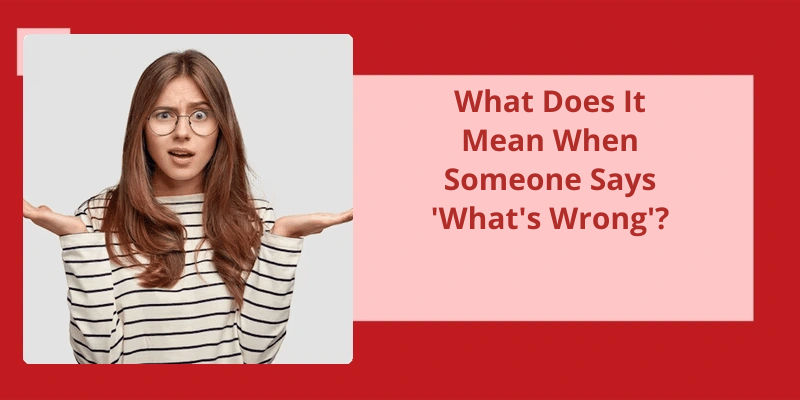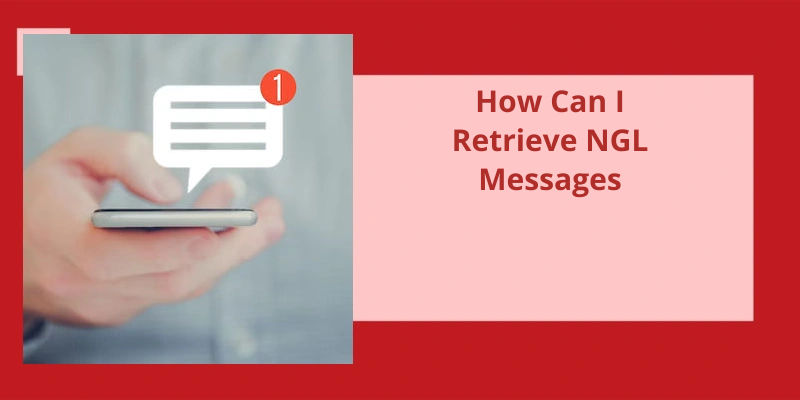As social creatures, humans have an innate desire to connect and empathize with one another, making communication crucial for fostering healthy relationships. One of the most common expressions used to initiate communication and show concern for others is to ask, "What's wrong?" However, this seemingly innocuous phrase can carry a variety of connotations and implications depending on the context and tone in which it’s delivered. Whether it’s used to express sympathy, to offer comfort and support, or to express annoyance and frustration, understanding the true intent behind this question is crucial for effective communication and building strong personal connections.
What Is the Alternative to Saying What’s Wrong?
Have you been in a situation where you want to ask someone about their feelings, but you don’t know how to phrase it without sounding confrontational or insensitive? One alternative to saying “whats wrong” is to ask “whats on your mind?”. This open-ended question allows the person to express themselves freely, and it shows that you’re genuinely interested in their thoughts.
Another word for “whats wrong” is “whats the matter.”. This is a more gentle way of asking about someones feelings, and it can be used in a variety of situations. For example, if someone seems upset or distracted, you might ask “whats the matter?” to show that you’re concerned.
If you’re looking for a more specific question to ask, you could try “whats the issue?”. This might be appropriate in a professional or academic setting where you want to address a particular problem or challenge.
When asking about someones emotional state, it’s important to be mindful of your tone and body language. Using a kind and empathetic tone, you could ask “whats your problem” or “is there a problem?”. These questions convey a sense of support and openness, rather than judgment or criticism.
Finally, if you want to check in with someone in a more casual setting, you could ask “whats good?”. This phrase is commonly used among friends to ask about each others well-being or to simply say hello. It’s a friendly and informal way to start a conversation and connect with others.
There are many alternatives to saying “whats wrong” that can help you to show empathy and support for others. By using open-ended questions, specific language, and a kind tone, you can create a safe and supportive space for others to share their thoughts and feelings. So next time you want to check in with someone, consider trying one of these options instead of defaulting to “whats wrong.”
The concept of the wrong person is multifaceted and can encompass a range of circumstances. It can refer to something that’s incorrect or untrue, such as a wrong answer to a question. On the other hand, it can also involve a person who’s acting or making judgments in error, leading to negative consequences for themselves or others. Understanding the different meanings behind this term is crucial in navigating various situations and relationships.
What Is the Meaning of Wrong Person?
3 having incompatible values or goals. 4 unsuitable or inappropriate for a specific task or situation. 5 someone who isn’t the right fit for a particular job or role. The concept of the “wrong person” can have various interpretations depending on the context.
In the academic arena, the idea of a “wrong person” can be applied to the field of psychology. For instance, a therapist who doesn’t have the required skills or training to address a patients needs may be considered the “wrong person” for that individual. In this case, the therapists lack of qualifications can potentially harm the patient and impede their progress towards recovery.
Similarly, in the workplace, hiring the wrong person for a job can have detrimental consequences for a company. For example, if a candidate is hired who’s goals or values that don’t align with the companys mission, they may cause friction within the workplace and ultimately reduce productivity. The “wrong person” in this case may be someone who doesn’t have the necessary skills or experience to perform the job effectively or someone who isn’t a good fit culturally within the organization.
In personal relationships, such as romantic partnerships or friendships, the concept of the “wrong person” takes on a more intimate meaning. Here, it refers to an individual who isn’t compatible with another persons goals, values, or communication style. For example, someone who’s looking for a long-term commitment may consider someone who only wants a casual fling the “wrong person” for them. In this sense, finding the “right person” to build a relationship with is a matter of compatibility and shared values.
It can refer to someone who isn’t qualified for a job, has incompatible values, or isn’t a good match for a specific situation or task. To avoid negative outcomes, it’s essential to identify the “wrong person” early and make necessary changes to eliminate or minimize their impact.
Source: You’re talking to the wrong person? (what is the meaning …
In everyday conversations, we’ve all heard the phrase “What’s wrong with you?” These words are often used to show concern or to inquire about someone’s mood or behavior. However, this seemingly simple question may have a deeper meaning and can be interpreted differently depending on the context. Let’s explore the origins of this idiom and it’s various connotations.
What Is the Meaning of What’s Wrong With You?
The idiom “Whats wrong with you?” is used to inquire about someones condition, whether they’re physically unwell or if they’re experiencing emotional distress. When someone asks, “Whats wrong with you?” they want to understand the specific cause of the issue so they can provide support or assistance. It can be difficult for someone to admit that they’re struggling, or they may not be aware of whats bothering them, so this phrase opens the door for conversation.
This expression is also often used to question a persons behavior, rather than their physical or emotional state. For example, if someone is acting out of character or behaving in a way that isn’t typical for them, someone else might ask, “Whats wrong with you?” in a more confrontational manner to try to get to the root of the issue. This could be perceived as judgmental or critical, so it’s important to use the phrase in the right context with the right tone.
When seeking medical advice or treatment, it’s essential to be honest about the symptoms and any underlying medical history. In this instance, the phrase may not have a negative connotation, as it’s being used in a professional context with a clear intention to help.
It can be used to ask about someones physical or emotional well-being, question a persons behavior, or seek medical advice. It’s important to use appropriate language and tone when asking this question, as it can be sensitive, and potentially cause offense if not used correctly. Ultimately, it’s critical to approach the situation with empathy and kindness, and to try to be of assistance to the individual in need.
The word “wrong” carries multiple definitions, ranging from being incorrect or inaccurate to being unjust and immoral. Oxford Languages provides a comprehensive list of dictionary definitions that demonstrate the various uses of the word. Let’s take a closer look at it’s different meanings and how they manifest in our lives.
What Is the Full Meaning of Wrong?
The concept of wrong is a complex and nuanced one that encompasses many different meanings and interpretations. At it’s core, however, wrong can be understood as something that isn’t correct or true, as well as something that’s unjust, dishonest, or immoral. In it’s adjective form, wrong can be used to describe something that’s mistaken, erroneous, inaccurate, or off-target. It can also convey a sense of moral culpability, as in the case of actions that are dishonest or unethical.
For example, someone might ask “what am I doing wrong?” when trying to learn a new skill or improve their performance in a certain area. This might include acts of violence, crime, or other forms of harm inflicted on others.
This might involve lying or cheating, or treating someone unfairly or unjustly in some other way. When someone has been wronged, it means that they’ve been treated unfairly or suffered some form of injustice at the hands of someone else.
It’s often used to describe situations where something isn’t as it should be, or when someone has acted in a way that’s unjust or immoral towards others. By understanding the various ways in which the term can be used, we can gain a better appreciation for how it applies to our daily lives and interactions with others.
The Consequences of Doing Wrong: Examining the Impact of Wrong Actions on Individuals and Society at Large.
- Legal consequences such as fines, imprisonment or community service
- Loss of reputation and respect from others
- Risk of physical harm or injury
- Deterioration of mental health and emotional well-being
- Financial consequences such as debt or bankruptcy
- Damage to relationships and social networks
- Compromising one’s own values and beliefs
- Contributing to a culture of wrongdoing and corruption
- Negative impact on society as a whole, including economic and political instability
There are numerous words that can be used to indicate that something is incorrect or untrue. Some similar words to “wrong” include erroneous, inaccurate, and misleading, while some opposite words include correct, spot on, and appropriate. In addition, “wrong” can also describe immoral or unjust actions, with similar words including dishonest, corrupt, and sinful, and opposite words including ethical and legal.
What Are Some Words That Mean Wrong?
Words are powerful tools for communication, and their meanings shape our understanding of the world around us. When words carry negative connotations, they can be used to criticize or condemn something or someone. “Wrong” is one such word that carries a strong negative meaning.
To say that something is “wrong” is to indicate that it’s incorrect or untrue. Synonyms for “wrong” include “incorrect,” “mistaken,” and “inaccurate.”. These words suggest that a mistake has been made, or that the information is flawed in some way. On the other hand, antonyms for “wrong” include “right,” “correct,” and “spot on.”. These words suggest that the information is accurate and true.
When we say that someone has done something “wrong,” we indicate that they’ve acted unjustly, dishonestly, or immorally. Synonyms for this sense of “wrong” include “unethical,” “dishonest,” and “corrupt.”. Antonyms for this sense of “wrong” include “ethical” and “moral.”
When we talk about actions that are “wrong,” we often use words like “crime,” “injustice,” and “violation.”. These words suggest that a law or moral principle has been broken, and that there are consequences for that action. Similarly, antonyms for this sense of “wrong” include “justice,” “fairness,” and “equity.”
In addition to actions, we can also use the word “wrong” to describe a state of being. Synonyms for this sense of “wrong” include “amiss,” “awry,” and “faulty.”
By understanding the various synonyms and antonyms for “wrong,” we can gain a deeper appreciation for the nuances of language and how we use words to communicate meaning.
Examples of Situations Where the Word “Wrong” Might Be Used and It’s Impact on the Conversation or Relationship (e.g. In a Debate, in a Relationship Argument, in a Workplace, Etc.)
- During a heated debate when one participant believes another has stated incorrect information
- In a relationship argument when one partner feels betrayed or mistreated by the other
- In a workplace setting when an employee makes a significant mistake that affects the company or it’s clients
- In a legal context when someone is accused of breaking the law or acting immorally
- When discussing ethics or moral principles and someone’s actions are deemed to be in opposition
- In a situation where someone’s behavior goes against cultural or societal norms
- When giving feedback on a project or performance that doesn’t meet expectations
- While discussing personal values or beliefs that conflict with the actions or beliefs of someone else
- When calling out someone for their inappropriate or offensive behavior
- During an evaluation or review where performance or behavior is critiqued
Treating someone unfairly or wrongly is a common issue faced by many individuals in today’s society. Whether it’s intentional or not, wronging someone can have grave impacts on their physical, mental, and emotional well-being. It’s crucial to understand the meaning of “to wrong someone” and the consequences that come with it. In this article, we’ll explore the different types of wronging, it’s effects, and ways to overcome and prevent it.
What Is the Meaning of to Wrong Someone?
The idea of wronging someone is often viewed as an act that’s morally reprehensible. When an individual wrongs another, they’re typically treating them unfairly, either through their actions or their words. In essence, wronging someone can be seen as a form of mistreatment, one that can have significant negative consequences for the person who’s been wronged.
In many cases, people who wrong others may do so intentionally, either because they harbor ill feelings towards someone or because they want to gain some sort of advantage over them. However, it’s also possible for people to wrong others without realizing what they’re doing or the harm that it can cause. This can be unintentional, but the damage that’s done can still be significant.
This can take many different forms – it may involve a breach of trust, abuse, mistreatment, or neglect. Regardless of the specifics, the end result is the same: the person who’s been wronged is likely to feel hurt, angry, or alone, and they may struggle to rebuild their trust in others.
Perhaps one of the most challenging things about being wronged is the fact that it can be difficult to move on from. Whether the wrong that’s been done is small or large, it can linger in the mind of the person who’s been wronged, causing them to feel upset or angry long after the initial incident has passed. This can be particularly difficult in situations where the person who’s wronged them is someone who they need to interact with on a regular basis, such as a family member or a co-worker.
Examples of Common Ways People Wrong Each Other in Personal Relationships, Work, or Society in General.
- Lying and dishonesty
- Disrespect
- Unfair treatment
- Broken promises
- Infidelity
- Ignorance and lack of empathy
- Jealousy and envy
- Manipulation and control
- Verbal or physical abuse
- Discrimination and prejudice
Conclusion
Overall, the phrase "what's wrong" carries a lot of weight and can be interpreted in various ways depending on the context and tone of voice used. It can be a simple inquiry or a deeper concern about someone's well-being. It can be used to start a conversation or to show empathy towards someone who may be going through a difficult time. However, it’s important to be mindful of how this question is perceived by the other person and to approach it with empathy and understanding. As with any form of communication, the key is to listen actively and respond with respect and kindness.






